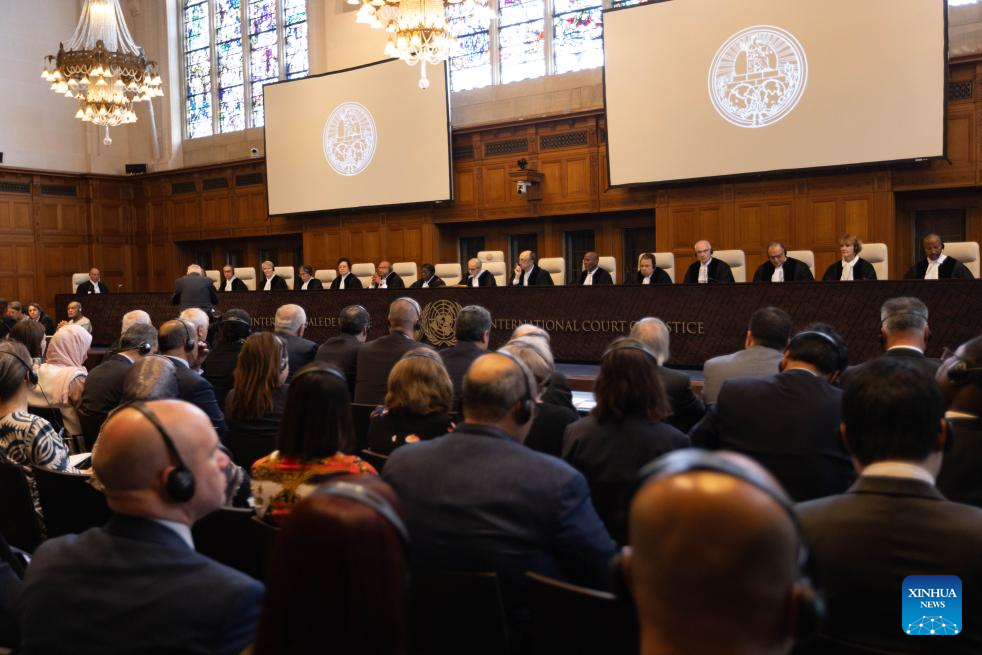ICJ ruling against Israeli occupation wins global support
By JAN YUMUL in Hong Kong | chinadaily.com.cn | Updated: 2024-07-21 16:37

The International Court of Justice's historic decision ruling Israel's occupation of the Palestinian territories as "illegal" has been widely welcomed by Middle East, Asian and Western leaders, strengthening the case to end the conflict and work toward a two-state solution.
However, Israeli Prime Minister Benjamin Netanyahu – currently facing domestic pressure at home to reach a cease-fire deal before departing for the United States this week – has slammed it as "absurd", adding that no opinion from The Hague "can deny the historical truth or legal right of Israelis" to live in their "ancestral home".
The court's 83-page report titled "Legal Consequences Arising From The Policies And Practices Of Israel In The Occupied Palestinian Territory, Including East Jerusalem" issued on July 19 concluded that Israel's broad policies in its "capacity as an occupying power" constituted systemic discrimination against the Palestinians.
The decision also came just a day after the Knesset, or Israel's parliament, rejected a resolution establishing Palestinian Statehood, which itself was criticized widely.
The ICJ also considered that Israel's policies and practices obstructed the right of the Palestinian to determine its political status and to pursue its economic, social and cultural development. It also ruled that Israel's occupation of the West Bank is in violation of international law.
In a statement, Jasem Mohamed Albudaiwi, secretary-general of the Gulf Cooperation Council, said that the ICJ's legal opinion "confirms and reinforces the Palestinian people's attainment of their legitimate and legal rights in accordance with international and United Nations resolutions to regain the Palestinian territories seized by the Israeli occupation forces."
He pointed out that the settlement decisions and attempts to change the geography carried out by the Israeli army are illegitimate measures that do not enjoy any regional or international recognition, stressing that the seized Palestinian territories will "remain Palestinian and an inherent right of the Palestinian people".
Albudaiwi also reiterated the GCC's support for the establishment of an independent Palestinian state within the borders of June 4, 1967, with East Jerusalem as its capital.
The GCC comprises the United Arab Emirates, Saudi Arabia, Oman, Bahrain, Qatar and Kuwait.
Arab League Secretary-General Ahmed Aboul Gheit said in a statement that the ICJ's advisory opinion constituted "a key legal pillar in supporting the Palestinian narrative and boosting its legitimacy and credibility".
He also said it helped counter Israel's attempts "to blur the lines around the nature and origin of the conflict to tighten its grip on the Occupied Palestinian Territory".
In its statement, the European Union said the ICJ's conclusions "are largely consistent with EU positions", which were themselves "fully aligned on UN resolutions regarding the status of the Occupied Palestinian Territory".
"In a world of constant and increasing violations of international law, it is our moral duty to reaffirm our unwavering commitment to all ICJ decisions in a consistent manner, irrespective of the subject in question," the statement said.
"The ICJ Advisory Opinion will need to be analyzed more thoroughly, including in view of its implications for EU policy," it added.
Countries who backed the ICJ's decision included Belgium, Iceland, Norway, Ireland, Slovenia, Spain, the United Kingdom, the UAE, Saudi Arabia, Qatar, and Egypt.
Omar Awadallah, Palestine's assistant foreign minister for the UN and Specialized Agencies and part of the delegation to the court sessions, said that the "historic" advisory opinion was "not only for the question of Palestine, but for justice and for all the legal system" as he believed that this determination "will help in achieving justice and stability in the region if it's implemented".
He stressed this was why it was important to work with the international community, with the UN, and other states toward imposing a mechanism toward ending this Israeli occupation.
"Our move will be toward countries bilaterally. That means that we will be working with states toward taking irreversible steps, toward taking actions by putting consequences on this illegal occupation by not assessed or render aid or recognizing the illegality that Israel is doing and consolidating in the occupied Palestinian territories," Awadallah told China Daily.
He said there were many things to be done whether at the UN General Assembly or the UN Security Council level or any other organ within the UN Human Rights Council, and other bodies in the UN toward implementing this important and significant and landmark advisory opinion.
"We believe that the court said that they did what they had to do on moral and legal basis and it's time for the international community to act on these moral and legal bases to end this illegality," said Awadallah.
Hassan Ben Imran, board member at Law for Palestine, a nonprofit human rights organization, praised the court's advisory opinion as "good" as it offered several legal grounds for Palestinians "to further their legal struggle for freedom and liberation".
"However, it should be noted that there is no expectation that Israel would comply with it. Israel has given absolutely no reason to believe in a fraction of that," Imran told China Daily.
"Therefore, the only way forward is imposing sanctions, economic, political and military ones, on Israel. Israel's membership at the UN and other international fora, like the FIFA for instance, should be suspended," he added.
























